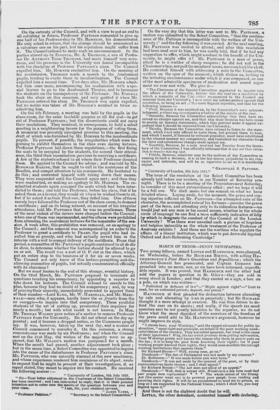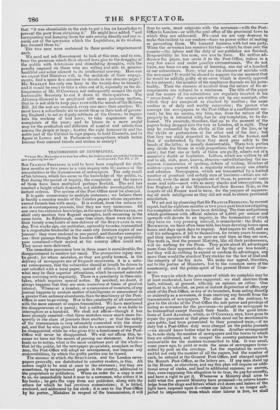MARCH OF ERROR—PENNY NEWSPAPERS.
Two young fellows, named LITTLE and HANDCOCK, were charged, on Wednesday, before Sir RICHARD BIRNIE, with selling HE. THERINGTON'S Poor Man's Guardian and Republican; which the Attorney-General has prosecuted, and Captain GORDON' has preached into no mean, nor, as we have been informed, unprofit- able repute. It was proved, that HANDCOCK and the other had sold the papers in question in St. Giles's—they are sold in every street in London ; and that they carried as a sign, a box on a pole, on which was written- " Published in defiance of law"—" Might against right"—" Lent to read, for an unlimited period ; deposit, one penny."
HANDCOCK at first pleaded the distinction between alienating by sale and alienating by loan in perpetuity ; but Sir RICHARD thought it a mere attempt at evasion. He was thus driven to de- fend the case on its merits ; and really, if the speech (as most speeches are) be not greatly beholden to the reporter, we do not know what the most dignified of the assertors of the freedom of the press could add to Mr. HANDCOCK 'S argument, however he might improve its style.
"1 stands here, your Worships," said the ragged advocate for public in- struction, " upon right and principle, on behalf of the poor working unedi- cated classes of the country, They are called ignorant, but what is the cause of their ignorance ? Why, the tax which prevents them getting information. Your Worships pretty well knows the reason why them in power puts on
the tax ; it is to keep the poor from knowing their rights ; for if poor working people knowed their rights, they would soon annilate the corrupt existing institutions that oppress them." Sir Richard Birnie—" Well, young man, go on." Handcock—" The Act of Parliament was not made by my consent." Dr. Robinson—" It was made before you were born."
Handcock—" It was not made by the consent of the poor, or by their representatives fairly chosen ; and I shall appeal."
Sir Richard Birnie—" The Act does not allow of an appeal."
Handcock—" Well, that is worser still. Would such a law been made had poor people been represented? * • • The whole intent of the Stamp Act (the orator went on) is to prevent poor people from reading and knowing their rights. It will be no punishment to send me to prison, so long as I am supported by the National Union ; which I shall be, you may depend upon it."
And there is not the slightest doubt that he will. LITTLE, the other defendant, contented himself with declaring, that "it was abominable in the rich to put a tax on knowledge to prevent the poor from obtaining it." He might have added, " and transporting and hanging them for acts arising directly and neces- sarily out of the ignorance which the Legislature, in its wisdom, has doomed them to."
The two men were sentenced to three months' imprisonment each.
We need not ask Government to look at this case, and to con- trast the premium which their absurd laws give to the drugging of the public with deleterious and stimulating draughts, with the penalty imposed on those who are willing and able to minister healthful and sober aliment to its intellectual craving. How can we expect that Ministers will, in the multitude of their engage- ments, find a spare five minutes to devote to our obscure pages ? Mr. STANLEY has only one hour in the twenty-four to himself; and it would be cruel to take a slice out of it, especially as the de- linquencies of Mr. O'CONNELL not unfrequently compel the right honourable Secretary to cut it down to three-quarters. The Attorney-General is so perplexed with more pressing matters, that he is not able to keep pace even with the march of the Reform Bill. All the rest are occupied, every one more than another. We must have a subordinate set to assist them in their task of govern- ing England ; to act as deputy-advisers of the Crown; to inquire into the working of bad laws ; to take cognizance of the complaints of the poor; and to labour in a mere useful way for the production and diffusion of comfort and satisfaction among the people at large ; leaving the right honourable and the noble part of the Cabinet to sign papers, to hold Councils, and to figure at Levees and in Parliament—occupations which better become their eminent talents and station in society !



























 Previous page
Previous page